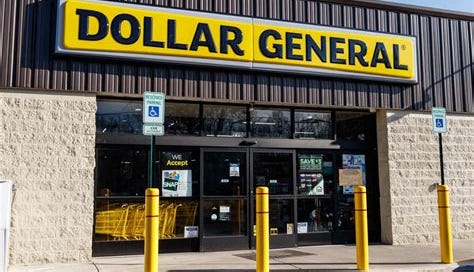I saw this article yesterday.
Just as large pharmacy chains have tried having clinics, Dollar General is going to give it a whirl.
Physicians are often very cynical about such endeavors, and not without reason. The problem with clinics in retail businesses is that the retail business wants to make money and save money. They typically are going to hire the least expensive staff possible. Which means they won’t hire physicians, they may hire PAs or nurse practitioners, and they’re likely to hire new grad PA or NPs so that they can pay them very little.
I suspect the premise is that they won’t be taking care of sick or complicated people. However, what I have observed in my 29 years of practice is that patients do not read signs about how sick they should or should not be. They simply feel bad and show up where it looks like there might be somebody to help them. This includes those with heart attacks, with babies trying to exit mothers bodies and enter the world, with old folks having heart attacks or young folks who have been shot or stabbed.
What this means is that when you put someone in a clinic who hasn’t had sufficient education or experience, they may be 1) rapidly overwhelmed or 2) make easily preventible mistakes.
Now, I applaud Dollar General for this move. I like it. That’s because I live and work in rural America. One of my sons worked there for a while. And in all too many communities, Dollar General is the only place to purchase anything without driving maybe 30 miles or more. They have a footprint. They have communications and a supply chain. I believe that done well, this could really help with at least primary care in rural areas. But it will require proper staffing, preparation for temporary care of serious emergencies (they’ll see that clinic sign and show up, I promise), robust transfer capacity, arrangements with nearby EMS and hospitals and, just possibly, a helicopter pad. (Or a large field nearby…not uncommon in more remote areas.)
But let’s take it one step further. Why don’t large industries, who are located in rural areas, step up and build hospitals? I remember as a child in Huntington, WV, learning that before I was born, the Chesapeake and Ohio rail company had an old hospital in town.
Now, this hospital was meant for employees of the company. But it was a solid idea.
Why don’t we return to this, but expand it not to employees but to regions?
The thing that comes to mind is the vast expanse of the Midwest. I trained in Indianapolis, and many days and nights flew out across the fields and farms to pick up sick and injured folks, stabilize them and bring them to the trauma center.
Much of the Midwest is farmland. Why not, for example, John Deere Hospital in the rural farmlands of Nebraska?
Why not the Exxon Hospital on the Gulf Coast? Why not Duke Energy hospitals in rural NC? The list goes on and on of course. The hard reality is that as things stand, private equity companies aren’t that interested in remote areas that have a poor likely hood of financial return. They may buy dying hospitals but don’t keep them long; the investors won’t have it.
But in places where hard work is done, work that the nation really needs, maybe major companies could create facilities that would at least offer primary care and stabilize the sickest. The people who work in these hard, dangerous jobs like mining, energy production, timber, agriculture and manufacturing (to name a few) deserve better than to have their hospitals closed and to have some snarky person say ‘well, you should just live in the city.’ And trust me, as I’ve linked before, they are closing at an alarming rate.
https://www.poynter.org/reporting-editing/2022/more-rural-hospitals-will-close-in-2023/
These needn’t be enormous trauma centers. Just, as one government official once said to me, ‘medical outposts.’
The federal government is overwhelmed and underdelivering. We can’t count on them to solve this issue, certainly not alone. Still reeling from COVID, the feds are out of touch with what small communities need and the challenges of rural hospitals…and their tax paying rural citizens.
‘But Dr. Leap, you can’t let medicine get in bed with business.’
Please. The list of healthcare CEOs making millions of dollars instantly makes that a ridiculous statement. The list of hospitals owned by private equity likewise. The national willingness to involve companies like Pfizer and Moderna during the pandemic shows that there’s no reason my idea can’t at least be entertained. (Don’t worry, if John Deere, brings me a hat I’ll remember that doctors aren’t supposed to taks so much as a pen or sandwich from drug reps. Then I’ll take the hat.)
I hurt for my patients when they can’t get care. When they need to drive hours for follow up. Whey they can’t leave work or afford the gas to drive to visit hospitalized relatives. When they can’t have an obstetrician nearby for sudden labor. When they can’t be resuscitated after injuries that would have been survivable near a trauma center.
How much of this medical scarcity would be tolerated in Manhattan or LA? In Chicago or Denver?
If Americans deserve healthcare then all of them do, not just those who are currently in convenient locations.
Thoughts? Have a great day!
Edwin





The business of healthcare is a nightmare, beset by complicated regulatory issues, liability issues, staffing concerns, insurance denials and decreasing profitability. Why would anybody want to build a hospital? Especially a profitable, well-run company that knows nothing about how to manage all these conflicting issues?